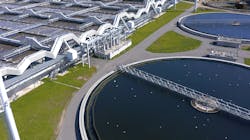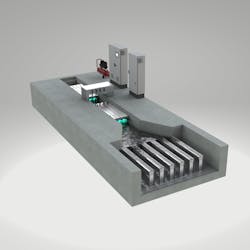The power of UV treatment for wastewater
Governments worldwide are striving to find effective solutions to address our planet’s environmental challenges. One area that’s coming into sharp focus is the treatment and reuse of municipal wastewater.
Wastewater treatment facilities play a vital role in maintaining public health by removing harmful contaminants from wastewater before they are released into the environment. These contaminants may include pathogens like bacteria, viruses, and parasites, which can cause a wide range of diseases, from cholera to hepatitis to typhoid. Treatment facilities rely on various disinfection and filtration methods to remove these pathogens and ensure that the treated water they release is safe for use in non-potable applications like irrigation and toilet flushing.
Chlorination has long been the go-to method for wastewater treatment. Still, concerns about its hazardous byproducts and the danger they pose to surrounding areas and human health have prompted many governments and municipalities to explore alternative disinfection methods.
Ultraviolet (UV) treatment has emerged as a popular and effective solution among those alternatives. The UV disinfection equipment market is projected to grow from $5 billion in 2022 to $9.1 billion by 2027, with water and wastewater disinfection applications driving a majority of that growth.
What UV does in wastewater applications
UV wastewater treatment involves exposing wastewater to UV light to inactivate bacteria, viruses and parasites in the water. It has gained popularity due to its environmental advantages over chlorination. Primary among those advantages is the ability of UV to eliminate a wide range of harmful contaminants from water without the need for adding chemicals. UV light damages the genetic material of microorganisms and renders them unable to reproduce, without the need to add chemicals.
Utilities can bolster their environmental stewardship by adopting chemical-free UV treatment for wastewater. With this treatment, harmful chemicals are kept out of the ecosystem, and the strain on freshwater resources is also alleviated. Wastewater treated with UV can be used in lieu of fresh water for applications like irrigation, industrial processes, and groundwater replenishment for recycled water and water reuse programs.
Implementing UV treatment systems can also help reduce the discharge of untreated or poorly treated wastewater into natural water bodies like rivers and lakes. This safeguards the water quality of those bodies and protects the ecological balance of these sensitive ecosystems.
What does UV remove in wastewater?
Cryptosporidium
The science around UV treatment has significantly expanded over the past two decades, dispelling previous misconceptions about its effectiveness. For example, it was once believed that UV was relatively ineffective against Cryptosporidium, a genus of protozoans that cause gastrointestinal illness. But recent improvements in UV technology have made it highly effective in inactivating Cryptosporidium.
Pharmaceuticals & personal care products
UV treatment effectively removes emerging contaminants from wastewater, such as the residue from pharmaceuticals and personal care products. These substances, often not effectively removed by conventional treatment processes, can harm aquatic ecosystems and human health. UV treatment offers an additional layer of protection by breaking down and deactivating these harmful compounds.
Benefits of UV treatment
UV treatment offers other key benefits. Because it is a relatively compact and modular technology, it can be easily integrated into existing wastewater treatment plants without requiring major infrastructure modifications. This makes it a cost-effective solution compared to implementing entirely new treatment processes.
Additionally, the treatment is rapid, allowing for quick and continuous operation. The disinfection occurs almost instantaneously, as soon as the wastewater is exposed to UV light. This enables efficient treatment even during peak-demand periods and ensures a reliable and consistent supply of treated wastewater for reuse.
From the wastewater facility operator’s point of view, replacing chemicals with UV treatment can also help to prevent accidents, mitigate risks and protect workers. For instance, UV equipment eliminates the need for storing and handling dangerous and highly flammable chemicals, thereby eliminating potential hazards like the risk of fire.
UV effectiveness across the globe
Singapore
UV wastewater treatment has played a crucial role in enabling countries and municipalities to achieve their sustainability goals. Singapore’s NEWater initiative is a prime example, producing high-grade reclaimed water through a combination of techniques. UV treatment plays a key role in ensuring that Singapore’s water is safe and free from harmful pathogens, contributing to the country’s water sustainability and reducing its reliance on imported water sources.
Orange County Water District
Another example is the Orange County Water District’s Groundwater Replenishment System (GWRS). The system takes highly treated wastewater that would have previously been discharged into the Pacific Ocean and purifies it using a three-step treatment process consisting of microfiltration, reverse osmosis, and UV light. GWRS has significantly reduced the reliance on imported water and provides a sustainable and drought-resilient water supply for Orange County.
A future for water recycling and reuse
Embracing UV treatment as part of water reuse strategies is a game changer for governments and municipalities worldwide. By harnessing the power of UV technology, wastewater treatment facilities can play a pivotal role in building a more sustainable and water-wise future for communities around the world.
About the Author
Giuseppe Faretra
regional sales manager for West and Central Europe, Nuvonic
Giuseppe Faretra is the segment sales manager at Nuvonic, with 25 years of expertise in ultraviolet (UV) technology's application in water treatment. His primary role involves spearheading sales initiatives within a distinct customer segments and industry verticals within the EMEA region

